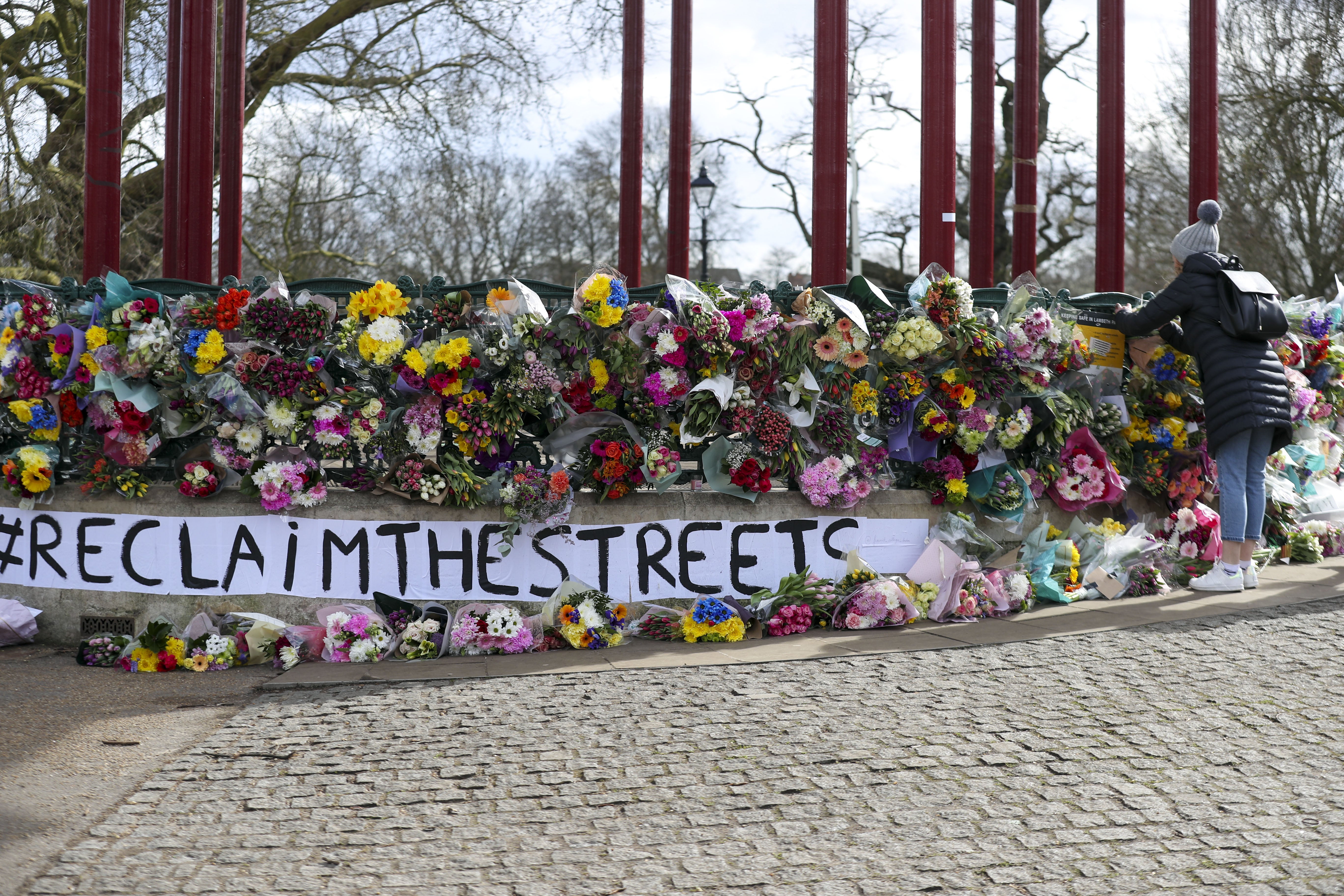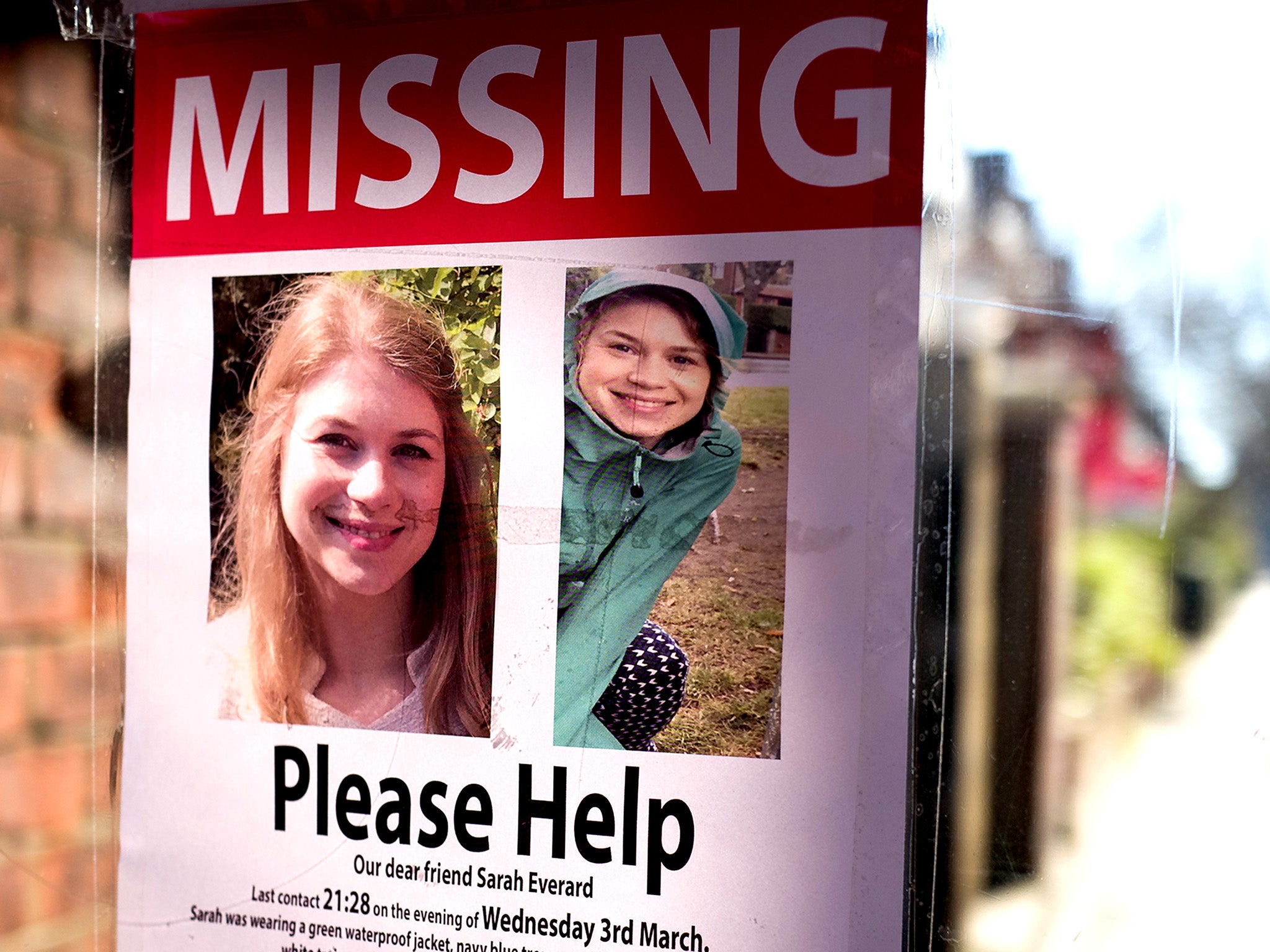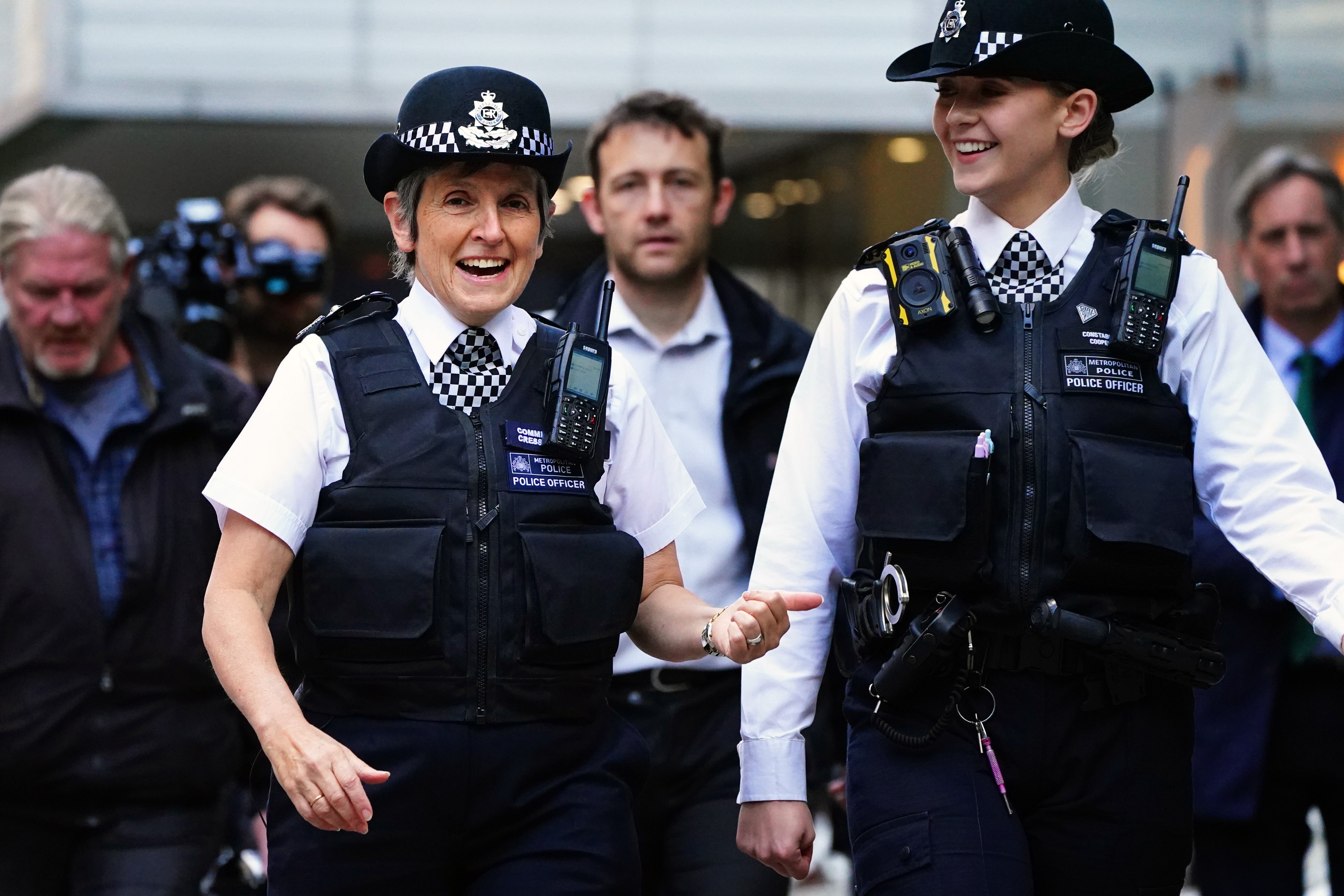Reclaim These Streets: Inside the Sarah Everard campaign group police ‘tried to silence’
‘It was about reclaiming all the dark corners and trees you can hide behind, the scariness of being out as a woman after dark,’ founders tell Lizzie Dearden

Your support helps us to tell the story
From reproductive rights to climate change to Big Tech, The Independent is on the ground when the story is developing. Whether it's investigating the financials of Elon Musk's pro-Trump PAC or producing our latest documentary, 'The A Word', which shines a light on the American women fighting for reproductive rights, we know how important it is to parse out the facts from the messaging.
At such a critical moment in US history, we need reporters on the ground. Your donation allows us to keep sending journalists to speak to both sides of the story.
The Independent is trusted by Americans across the entire political spectrum. And unlike many other quality news outlets, we choose not to lock Americans out of our reporting and analysis with paywalls. We believe quality journalism should be available to everyone, paid for by those who can afford it.
Your support makes all the difference.“Sarah’s missing poster was everywhere,” says Anna Birley. “It was on every tree, lamp post, bus stop. Her face is completely imprinted in memory.”
The 32-year-old is a councillor representing the area where Sarah Everard disappeared on 3 March 2021.
Three days later, the Metropolitan Police issued a missing person’s appeal with details of the route she may have taken home from a friend’s house, and official posters started appearing as officers went door-to-door questioning local residents.
“The disappearance was the topic of every WhatsApp conversation with female friends,” Anna recalls. “You couldn’t avoid it online or outside.”
One of the friends in those chats was 29-year-old Ludo Orlando, who lived alone near the site of Ms Everard’s disappearance at the time.
“Everywhere it was her face, the missing poster with the blue jacket,” she said. “If I close my eyes, I can still see it.”
Ludo describes how as more details of Ms Everard’s last movements emerged – her route, her clothes – a wider discussion of women’s safety in public places started to gather momentum.
“It started with her and then something shifted,” she says. “I started reading on Twitter and everyone was sharing their experiences, and it grew and grew and grew into this massive ball of anger. Every single woman I know has gone through this to different degrees.”
On 10 March, one of Ludo and Anna’s friends wrote a tweet that received more than 175,000 likes.
It said: “If I see one more comment on Sarah Everard making a ‘poor decision’ to walk home alone at night, I might scream.
“I was attacked in broad daylight on a bright sunny morning, yards from my front door. Stop focusing on women's choices and start focusing on the men that attack us.”
By that date, public anger was growing further after police had confirmed that a serving officer had been arrested over Ms Everard’s disappearance.
Anna and Ludo’s WhatsApp group with friends was in a frenzy, moving from talk to action. The idea was formed to hold a vigil, not just for Ms Everard but for all women harmed and left feeling unsafe.
“We decided to call ourselves Reclaim These Streets,” Anna says, explaining the name was a deliberate allusion to the Reclaim the Night movement started in the 1970s, after police instructed women to stay home during the “Yorkshire Ripper” murders.

“It felt like the narrative around Sarah’s disappearance started to be about doing the right things to not be attacked.
“When you try to combine that with police telling women how to behave, and realising that we tell ourselves how to behave, it’s like ‘no – f*** this’.”
Ludo said that the initial discussion of a vigil had been focused on Ms Everard’s memory, but then it started “becoming about all women – there was a shift as more experiences started to come out”.
The newly formed group held a Zoom meeting on Wednesday 10 March 2021 and initially discussed plans to light some candles on Clapham Common, the park that Ms Everard walked through on her way home.
Anna said she originally thought around 100, mainly local, people may come. But within hours of a Facebook event being set up for the following Saturday, 4,000 people had registered to attend.
“I’ve organised a lot of events like fundraisers and community meetings, and there’s so much effort involved in getting people to turn up – I’ve never had the reverse,” Anna says. “It was unlike anything I’ve done before. I think meeting in person was important for people because we were being told to stay at home and because public places felt scary.
“We organised it to be at sunset deliberately because it was about reclaiming not just the park when it’s well lit and feels alright, but about reclaiming all the dark corners and trees you can hide behind, the scariness of being out as a woman after dark.”
Henna Shah was friends with Jessica Leigh, another Reclaim These Streets co-founder and Lambeth councillor, and joined after hearing about the plans.
“In the course of lockdown I’d met loads of friends on Clapham Common, and Sarah’s route to walk back to her flat is exactly the same route I use, to be safe,” she says.

“I expected there would be a few hundred local women and that we would locally be able to mark something that was important to us. I didn’t think it would have the kind of impact that it did.”
As news of the Reclaim These Streets event spread like wildfire on Facebook and Twitter, the founders started approaching women who were planning other vigils to see if they wanted to join forces.
Jamie Klingler, an American events manager living in London, was organising a rally in Trafalgar Square when she heard of the Clapham Common vigil.
She was introduced to Reclaim These Streets by a member who had met her at a book club, and was soon tasked with sourcing lights and a PA system for the rally.
“By Thursday morning we were all forces go, but then we got an email from Scotland Yard saying it was illegal and we couldn’t do it,” she adds.
Organisers felt they had the support of the council and local police in initial discussions over the vigil, but say the tone “completely changed” after it was referred to the Metropolitan Police headquarters.
Anna says she and other members had read the Covid laws in place at the time, as well as park bylaws and any information they could access on what they needed to draw up a risk assessment that would make the vigil safe.
“We had emailed the police on Wednesday night,” she adds. “I wanted it to be safe for people to come, so I wanted the police to have an open line of communication.”
But the following day, the situation “escalated” as Reclaim These Streets members started to meet with police to find ways forward.
“We had a couple of Zoom meetings with them and they they were saying, ‘It’s unlawful, you can’t have protests, we have to be consistent across all events, if you do this then you’ll put yourselves at risk of a £10,000 fixed penalty notice each and arrest under the Serious Crimes Act,’” Anna recalls.

The Clapham Common vigil was receiving national media coverage, and Reclaim These Streets had already been contacted by women in cities across the UK who wanted to hold linked events.
The group had created branded publicity material and other resources, which had been shared with organisers in more than 30 other locations, including Cardiff, Liverpool and Manchester.
The Metropolitan Police’s position was that every organiser could be fined £10,000 if there were more than 30 attendees, and the founders of Reclaim These Streets could be considered to have “intentionally encouraged or assisted” Covid offences.
Organisers believed a safely organised vigil would constitute a “reasonable excuse” under Covid laws and lodged an urgent legal challenge, which was heard at the High Court on Friday 12 March.
Mr Justice Holgate said that the objective was “to hold the vigil safely and lawfully” and that organisers had “taken care to liaise with local police officers”.
The judge confirmed that Covid laws did not amount to a blanket ban on protest, but declined to make a declaration on the legality of the event and said further communications should take place for the police to weigh the restrictions against human rights laws.
During a subsequent meeting where organisers were attempting to discuss ways to go ahead with the vigil, Scotland Yard published a press release saying the court had confirmed it “may conclude that attendance at a large gathering could be unlawful”.
The statement urged women wanting to attend the vigil to “stay at home or find a lawful and safer way to express your views”.
“I genuinely thought we were going to find a solution with them, and then while we were discussing doing this and that, the press release came out,” Ludo says.
Friday’s High Court judgment said the Met’s statement “failed accurately to reflect the law” and continued to suggest that the vigil was unlawful, when in fact it was “incumbent on the police to engage with the organisers” and discuss ways forward.
As a result of the police’s continued position that the vigil could result in £10,000 fines, not just for Reclaim These Streets members, but for the dozens of other women who organised linked events in cities across the UK, the group decided to cancel in the early hours of Saturday morning.
Shortly after 7am, they released a statement saying they had made “every effort to reach a positive outcome”, but “Scotland Yard would not engage with our suggestions to help ensure that a legal, Covid-secure vigil could take place”.
Reclaim These Streets members say they reached the decision collectively, at a meeting where concerns were expressed over the consequences of fines or arrests for women’s jobs, finances and life prospects.
“What really hurt was that we couldn’t go anywhere near the event for fear of being identified as organisers,” Henna says. “I couldn’t go down and pay my respects but Kate Middleton could, and she wasn’t going to get arrested.”
At the time their vigil was supposed to take place, Reclaim These Streets members instead took part in alternative memorials, including a doorstep candle vigil and online event, away from Clapham Common.
When they returned to their homes, they saw scenes unfolding on television of police pushing through the crowd and arresting women, pinning one to the ground.
“I felt bereft and sick and felt like I should have been there – I told women to go and then didn’t show up,” Jamie says.
“We absolutely knew people were going to turn up. The train had already left the station and then people got angrier because the police were trying to silence us.
“None of this would have happened if they had just let us get on with it. You can’t take away all the infrastructure and then say ‘look what you made us do’.”
Henna believes that it was partly the Metropolitan Police’s reaction that “pushed the vigil to the stratospheric level it became”.
“By that point we knew the officer had been charged so there was a real sense of people feeling uncomfortable about the police, particularly in London,” she says.
“We told the police that ‘no matter what you think people will turn up’. It would have made more sense to let us do something in a Covid-secure way than to create the environment they did.”
A year after forming solely to hold the vigil, Reclaim These Streets is still operating as a campaign group, and has widened its mission to wider issues of women’s safety and male violence.
“Every time a woman is killed or raped or new allegations come out about police conduct, there’s more to react to,” Anna says.
“I get a lot of women sharing their experiences. I get it on my council email, my social media direct messages, Twitter. I get letters posted to me at my work.”
Jess says she has been receiving “a lot” of reports about male police officers by their female colleagues, while Jamie and Ludo are on a board allocating the thousands of pounds raised by a crowdfunding drive to women’s organisations.
“It feels like a David and Goliath battle,” Anna says. “If we are going to get to the point where we don’t have a racist, sexist culture in the police it will need a lot of people to keep up the challenge.”



Join our commenting forum
Join thought-provoking conversations, follow other Independent readers and see their replies
0Comments